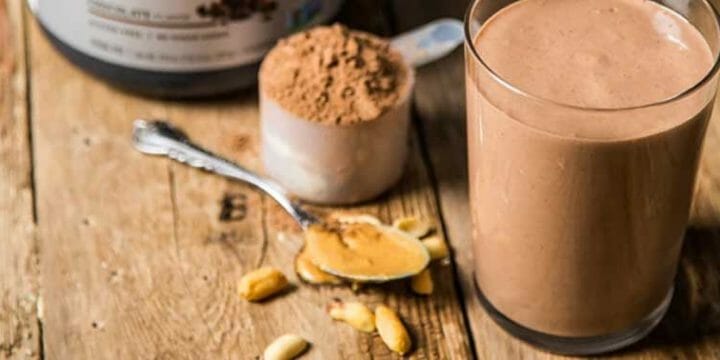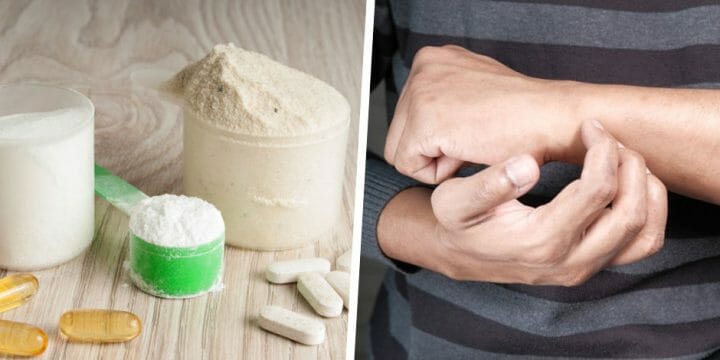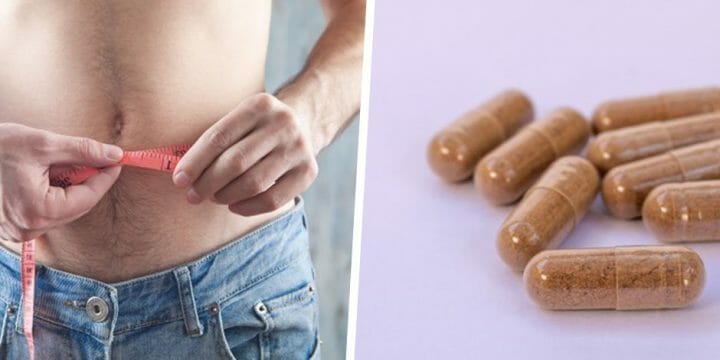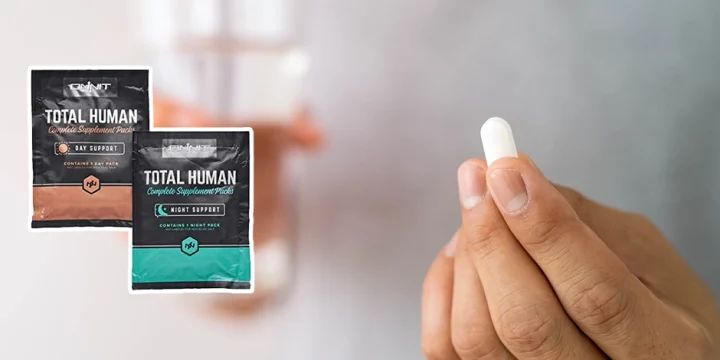The last thing you want to do when trying to lose weight is take a supplement that will cause weight gain.
My fitness clients know I read a lot of supplement ingredient labels to understand what they are putting in their bodies, and many ask me whether pre-workout will inhibit their weight loss efforts.
I took a deep dive into this topic by speaking to our dietitian here at Total Shape and researching several different ingredients instrumental in gaining weight.
So, do pre-workouts get in the way of your weight loss efforts? Let’s take a look.
Quick Summary
- Pre-workout supplements, particularly those containing creatine, can lead to weight gain primarily due to increased water retention in muscles.
- Reading labels and choosing pre-workouts with fewer additives can help avoid unnecessary calorie intake and support weight loss efforts.
- A study by the Journal of the International Society of Sports Nutrition reports that individuals may gain up to 4.5 pounds in the first week of creatine supplementation, mainly from water retention.
- Personally, I believe that while pre-workouts can be beneficial for enhanced exercise performance, it's crucial to select them based on individual health goals and potential side effects.
Could Pre-workout Cause You to Gain Weight?
Some ingredients in pre-workout supplements, like creatine, have been known to add a few pounds to my scale. I remember when I first started taking a pre-workout with creatine, I was puzzled by the slight weight gain.
But then, it hit me – it's not just about the number on the scale; it's about how energized and powerful I felt during my workouts.
First, let’s see how pre-workouts help you do that.
Related Article: Does Pre-Workout Help You Lose Weight?
Some Key Ingredients
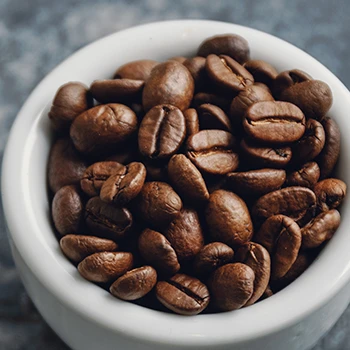
A hefty dose of caffeine is in just about every pre-workout because it boosts your exercise performance
There can also be the added benefit of better focus and fast reaction time, which are invaluable for workout sessions.
Creatine
According to a research from MDPI, creatine basically feeds your muscles energy and significantly contributes to increased muscle mass over the long term [1].
If you want to bulk up, this amino acid is your necessary gym partner.
You May Also Like: Best Creatine-Free Pre-workout Supplements
L-Citrulline
As per a research from WebMed, our bodies take the amino acid L-citrulline, found in many pre-workouts, and change it into l-arginine, a building block for nitric oxide [2]. Good nitric oxide levels mean healthy blood flow and lower blood pressure.
What does that mean for your workout? Increasing blood flow to your working muscles may delay fatigue and increase muscle pumps and recovery, potentially leading to bigger gains.
Branched-Chain Amino Acids
Branched-chain amino acids (BCAAs), according to reseacrh by the National Institute of Health (NIH), are essential amino acids, meaning your body does not produce them on its own. Adding BCAAs to pre-workout will fuel your muscles for those intense workouts [3].
British Journal of Sports Medicine also notes that beta-alanine is also a big helper when it comes to reducing muscle fatigue [4].
Do Any of These Common Ingredients Cause Weight Gain?

Creatine seems to be the biggest culprit for weight gain in this list of common pre-workout ingredients. Does this mean it’s bad? Not necessarily; let’s take a closer look.
High Water Retention
According to NIH, increased water retention is common when taking creatine because it draws water into your muscles [5]. Hydrated muscles are a good thing for recovery, but some people may feel bloated, or their muscles may look bigger due to this water accumulation.
In the Journal of the International Society of Sports Nutrition, a report stated that some individuals gain as much as 4.5 pounds in the first week of creatine supplementation, mainly due to water retention [6].
Muscle Growth

It’s no secret why creatine is in most pre-workout supplements.
Research from WebMed shows creatine increases muscle strength and endurance and reduces muscle damage [7].
It is important to remember that the scale may tip upward more with those muscle gains as muscle is more dense than fat.
Belly Fat Gain
Here is the good news.
Though creatine may encourage weight gain through water retention and increased muscle mass, creatine itself does not increase body fat. To gain fat, you must consume more calories than you burn. Creatine adds very little, if any, to a pre-workout supplement.
“Weight gain from creatine is not due to gaining fat but increased water content in your muscles.”
- Jared Meacham, Ph.D., RD, PMP, MBA, CSCS
Taking Pre-workouts When Trying to Lose Weight

Let’s look at what to pay close attention to when choosing a pre-workout supplement to avoid things that are counterproductive to losing weight.
Read the Label
One of the critical things to remember when taking pre-workout supplements is to avoid unnecessary calories. These calories come in the form of unnecessary additives, fillers, and sweeteners.
Less Is More
When I look at any supplement, pre-workouts included, I go with the “less is more” approach. Be cautious of a long list of seemingly impressive ingredients, as they probably aren’t.
According to NIH, artificial sweeteners can potentially hinder your efforts to lose weight [8].
Good all-natural sugar alternatives don’t add to the calorie count but help improve taste (stevia, which is plant-based and has zero calories, comes to mind), and this might cause you to drink guilt-free way more than you would otherwise.
Following the dosing instructions is essential for caloric intake and reducing any potential adverse effects from stimulants or other ingredients.
Stay away from proprietary blends as the ingredients and amounts are unclear. I encourage my clients to always know what they are putting in their bodies.
“Supplements list ingredients on their label in order of predominance. Steer clear of supplements that contain a long list of additives, including fillers, binders, sweeteners, or preservatives.”
- Rachael Link, MS, RD
2 Ingredients You Should Specially Look For
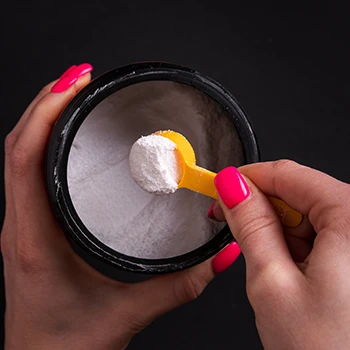
Creatine
I've found that creatine supplements can be a double-edged sword. On one hand, it's boosted my gym performance significantly.
On the other, I've had to deal with the extra water weight. But over time, I've learned to manage this by increasing my water intake, which seems a bit ironic, but it works wonders for keeping the bloat at bay.
We all know hydration is essential in everyday life, particularly with exercise and especially when taking creatine.
While it may seem counterintuitive, drinking water is one of the best ways to combat water retention. Staying hydrated promotes urination which helps get rid of excess water in your body.
Caffeine
Where creatine could be your weight loss foe, caffeine is your weight-loss friend. Research from the National Library of Medicine shows that caffeine promotes weight and fat loss and improves body mass index (BMI) [9].
We have already discussed it gives you increased focus and more energy. Finding a pre-workout with caffeine will be easy because practically all have it.
If you are sensitive to caffeine, I will avoid these pre-workouts as it generally equates to 2-3 cups of coffee. However, there are plenty of solid caffeine-free alternatives.
Related Pre-workout Articles:
Role of Macronutrients in Pre-Workout Formulas
Tracking macronutrients (carbs, proteins, and fats) when using pre-workout supplements is crucial to ensure they complement, rather than replace, a balanced diet.
Understanding macronutrient intake allows individuals to maintain their overall nutritional goals and support workout performance effectively.
- For instance, adequate carbohydrate intake ensures sustained energy during exercise.
- Protein aids in muscle repair and growth.
- Fats contribute to overall health and hormone production.
By monitoring macronutrients, pre-workout supplements can be integrated strategically to fill specific nutritional gaps or provide a targeted energy boost, rather than becoming a crutch that replaces the essential nutrients obtained from whole foods.
This balance helps achieve fitness goals while maintaining overall health and well-being.
FAQs
Does Pre-workout Make You Gain Water Weight?
Some pre-workout supplements may make you gain water weight, especially ones that include creatine. One of the known side effects of creatine is moderate water retention.
Can You Get Rid of Pre-workout Bloating?
Post-workout hydration helps get rid of pre-workout bloating. Keeping hydrated encourages urination which helps the body get rid of excess water.
References:
- https://www.mdpi.com/2072-6643/13/6/1915
- https://www.webmd.com/vitamins-and-supplements/l-citrulline-uses-and-risks
- https://www.ncbi.nlm.nih.gov/pmc/articles/PMC4241904/
- https://bjsm.bmj.com/content/51/8/658
- https://www.ncbi.nlm.nih.gov/pmc/articles/PMC155510/
- https://jissn.biomedcentral.com/articles/10.1186/1550-2783-4-6
- https://www.webmd.com/vitamins-and-supplements/creatine
- https://pubmed.ncbi.nlm.nih.gov/18535548/
- https://pubmed.ncbi.nlm.nih.gov/30335479/
About The Author
You May Also Like

